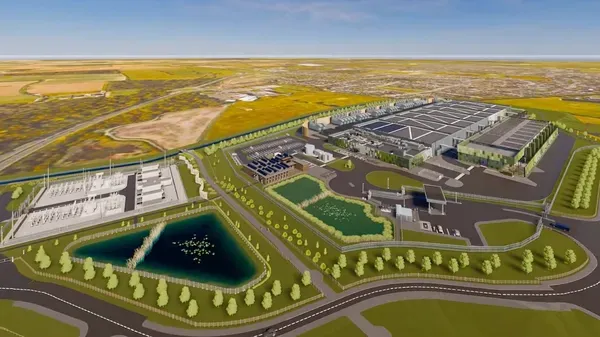Google just opened its newest UK data center in Waltham Cross, marking the centerpiece of a massive £5 billion investment blitz designed to cement Britain's position in the global AI race. The facility, inaugurated by Chancellor Rachel Reeves, represents Google's biggest UK infrastructure bet yet and signals the tech giant's confidence in Britain's AI economy despite ongoing regulatory pressures.
Google is making its biggest UK infrastructure play in years. The tech giant's new Waltham Cross data center in Hertfordshire went live today, headlining a staggering £5 billion investment commitment that spans capital expenditure, R&D, and engineering over the next 24 months. Chancellor Rachel Reeves personally cut the ribbon, underscoring the government's enthusiasm for Big Tech investments amid Britain's push to become an AI superpower. The facility represents more than just another server farm - it's Google's calculated bet on the UK's AI economy at a time when regulators across Europe are tightening their grip on American tech giants. The investment encompasses Google DeepMind operations, with the AI research arm's healthcare and scientific breakthroughs now backed by serious infrastructure muscle. According to Google's official announcement, the investment will support a projected 8,250 jobs annually across the UK, signaling confidence in local talent despite ongoing Brexit-related hiring challenges. The timing couldn't be more strategic. Britain's AI sector has been hungry for the kind of compute infrastructure that can handle next-generation AI workloads, and Google's betting that demand for its cloud services, search capabilities, and mapping technology will explode as businesses embrace AI transformation. The Waltham Cross facility is specifically designed to meet surging demand for Google Cloud, Search, and Maps - services that have become mission-critical as companies race to integrate AI into their operations. But Google's not just throwing money at the problem. The company struck an innovative deal with Shell to manage its UK carbon-free energy portfolio, deploying cutting-edge battery technology that stores surplus clean energy and feeds it back into the national grid during peak demand. It's a clever play that addresses two major concerns: energy costs and Britain's grid resilience challenges that have plagued data center expansion plans. The partnership positions Google as a grid stabilizer rather than just another energy consumer - a distinction that could prove crucial as the UK government weighs future data center regulations. This infrastructure push comes at a fascinating moment for Google in Europe. While the company faces mounting antitrust pressure from Brussels and increasing scrutiny over its AI dominance, it's simultaneously doubling down on European operations. The UK investment suggests Google sees post-Brexit Britain as a more business-friendly alternative to continental Europe's regulatory maze. Industry insiders point to the government's relatively light-touch approach to AI regulation compared to the EU's comprehensive AI Act. The broader context makes this investment even more significant. Amazon Web Services and Microsoft Azure have been aggressively expanding their UK data center footprints, creating a three-way battle for cloud infrastructure supremacy. Google's £5 billion commitment - spanning both physical infrastructure and R&D - represents its most aggressive counter-move yet in this high-stakes game. The ripple effects are already visible. UK tech startups report improved access to high-performance computing resources, while established enterprises are accelerating their AI adoption timelines knowing they'll have reliable infrastructure backing. Several major financial services firms have already signaled plans to expand their Google Cloud usage, betting on reduced latency and improved service reliability from the new facility. What's particularly telling is how Google's framing this as an "AI economy" investment rather than just another data center opening. The language signals the company's recognition that Britain's economic future hinges on its ability to harness artificial intelligence across sectors - from healthcare and financial services to manufacturing and creative industries.












